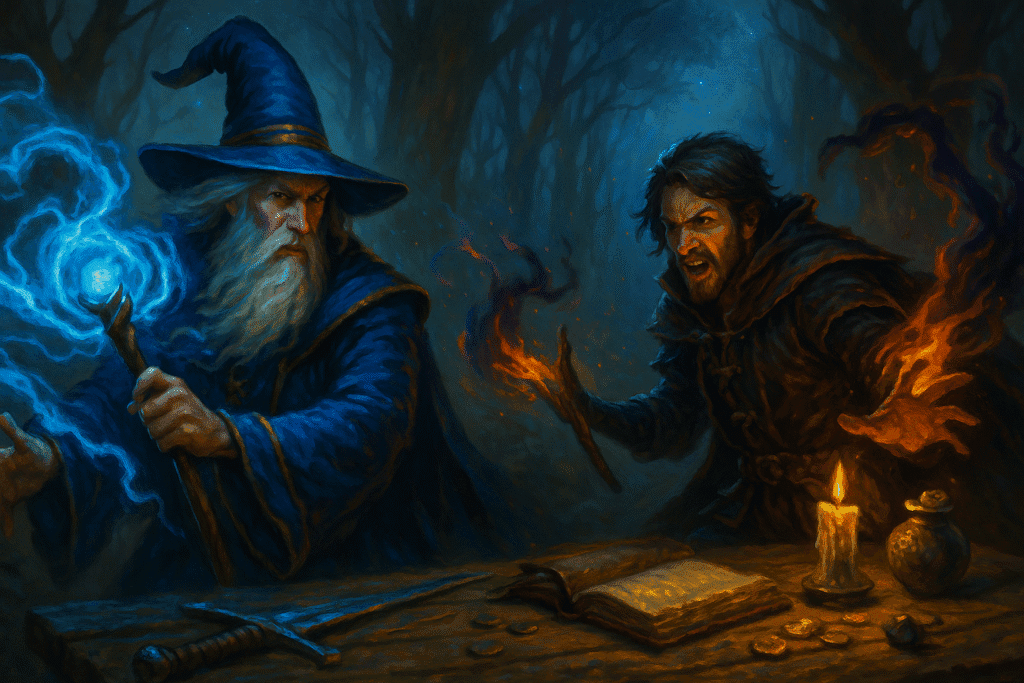In Dungeons & Dragons 5e, magic isn’t just for wizards and sorcerers. Many classes — from druids to clerics to bards — rely on spells to heal, harm, and control the battlefield. Whether you’re crafting a cunning wizard or a battle-hardened paladin, understanding D&D 5e spellcasting basics is essential to your success.
Let’s break down the essentials of spellcasting to help you unleash your magical potential.
Which Classes Use Spellcasting?
Several classes use spells as a core part of their identity:
- Full Spellcasters: Wizards, Sorcerers, Druids, Clerics, Bards, Warlocks.
- Half-Casters: Paladins and Rangers (limited spellcasting starting at 2nd level).
- Third-Casters: Eldritch Knights (Fighters) and Arcane Tricksters (Rogues) gain minor spellcasting abilities later.
Depending on your class, the number of spells you can learn, prepare, and cast each day varies.
Known Spells vs. Prepared Spells
One of the first important distinctions in D&D 5e spellcasting basics is:
- Known Spells: You pick a list of spells you know and can cast anytime (Bard, Sorcerer, Warlock).
- Prepared Spells: You prepare a list daily from your entire class spell list (Cleric, Druid, Paladin, Wizard).
Example:
- A Sorcerer knows a set number of spells that don’t change unless they level up.
- A Cleric can swap out prepared spells every day based on the situation.
What Are Spell Slots?
Spell slots represent your magical energy. They determine how many spells you can cast before needing a rest.
- Spell slots are organised by level (1st, 2nd, 3rd, etc.).
- You expend a slot each time you cast a spell.
- Higher-level spell slots can be used to cast lower-level spells with greater effects.
At 1st level, most casters will have 2 to 3 spell slots available.
Cantrips: Your Unlimited Magic
Cantrips are simple spells you can cast as much as you want without using spell slots.
Popular cantrips include:
- Fire Bolt (damage)
- Mage Hand (utility)
- Prestidigitation (minor magical effects)
- Sacred Flame (radiant damage)
Always pick cantrips that match your role: combat, support, or flavour.
How to Cast a Spell
To cast a spell, follow these steps:
- Choose the Spell: Decide which spell you want to cast.
- Check the Components: Some spells require verbal (V), somatic (S), or material (M) components.
- Use a Spell Slot: If it’s not a cantrip, expend an available spell slot.
- Attack Roll or Saving Throw: Some spells require an attack roll; others make enemies roll to resist.
- Effect: Apply the effects described in the spell.
Key Spellcasting Terms You Should Know
- Spell Save DC: The difficulty enemies must beat to resist your spells.
- Spell Attack Modifier: Bonus you add to spell attacks.
- Ritual Casting: Casting a spell without expending a slot (takes longer but saves resources).
- Concentration: Maintaining focus on a spell; getting hit may break concentration.

Choosing Your First Spells
New players often wonder: What spells should I pick?
Tips for smart spell selection:
- One Offensive Spell: Deal damage (e.g., Magic Missile).
- One Defensive Spell: Protect yourself (e.g., Shield or Mage Armour).
- One Utility Spell: Solve problems creatively (e.g., Detect Magic, Identify).
- One Healing Spell (if available): Keep the party alive (e.g., Cure Wounds).
Try to balance spells between combat, exploration, and social interaction!
Spellcasting Focus and Components
Instead of carrying material components for every spell, many casters use a spellcasting focus:
- A wizard might use a wand.
- A cleric might use a holy symbol.
- A druid might use a sprig of mistletoe.
This simplifies the process and speeds up casting in-game.
Final Thoughts: Magic at Your Fingertips
Spellcasting adds excitement, versatility, and power to any D&D 5e character. By understanding spell slots, cantrips, and preparation, you’ll be able to shape reality to your will.
Embrace the magic — your adventure is just beginning!

